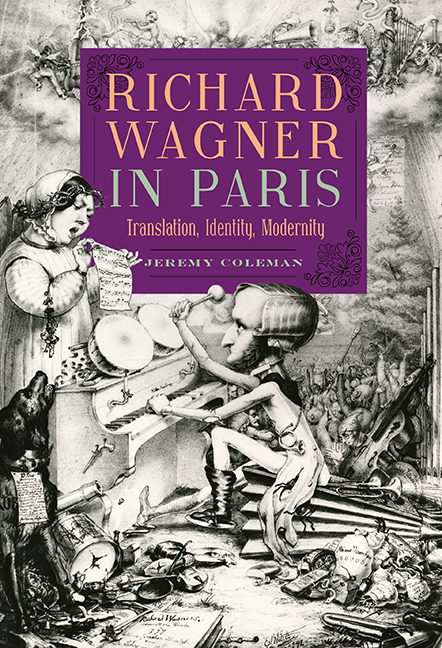Book contents
- Frontmatter
- Dedication
- Contents
- List of Illustrations
- List of Music Examples
- Note on the Text
- Acknowledgements
- Abbreviations
- Introduction: Wagner Against the Grain
- PART I PARIS YEARS, 1839–42
- PART II DRESDEN AND ZURICH, 1842–52
- PART III PARIS YEARS, 1859–61
- 5 Wagner Without Theatre: Aporias of Translation
- 6 All About Venus: Another Look at the “Paris” Tannhäuser
- Conclusion: Universality at the Crossroads
- Bibliography
- Index
6 - All About Venus: Another Look at the “Paris” Tannhäuser
from PART III - PARIS YEARS, 1859–61
Published online by Cambridge University Press: 25 March 2020
- Frontmatter
- Dedication
- Contents
- List of Illustrations
- List of Music Examples
- Note on the Text
- Acknowledgements
- Abbreviations
- Introduction: Wagner Against the Grain
- PART I PARIS YEARS, 1839–42
- PART II DRESDEN AND ZURICH, 1842–52
- PART III PARIS YEARS, 1859–61
- 5 Wagner Without Theatre: Aporias of Translation
- 6 All About Venus: Another Look at the “Paris” Tannhäuser
- Conclusion: Universality at the Crossroads
- Bibliography
- Index
Summary
THE case of the 1860 Théâtre-Italien concerts offers a glimpse of a few tangential connections between Wagner's intentions with the concert programmes and his literary and critical reception at the time. But to what extent does the constellation of translation and “pure” music shed light on the more well-known case of the Paris Tannhäuser (1861)? Information about this production is abundant and well known, including Wagner's revisions to the score and the creation of the Act 1 Ballet, the process of translating the libretto, and – especially – the production's reception and impact on French cultural identity during the Second Empire and beyond. This chapter offers some further interpretations of Wagner's musical expansions to the score and the task of translating and adapting the libretto, placing both in relation to contested questions of fidelity, expression and modernisation.
Carolyn Abbate laid the foundations for work on the sources of the Paris Tannhäuser, determining the precise nature and extent of Wagner's knotty involvement in the French translation of the poetic text for performance at the Opéra, the origins of which date back to 1857. At least five men were involved in this task in addition to Wagner himself, who collaborated with all of them: one M. de Charnal, the tenor Gustave-Hyppolite Roger, Edmond Roche (previously discussed in chapter 5), Richard Lindau, and Charles Nuitter. Wagner assisted with the task of the initial prose translation only after it became clear that details of his German text were likely to be misunderstood by his colleagues. This prose text then passed to Nuitter for versification. Roche's previous attempt at a versification had been rejected by Royer at the Opéra because it had been written in vers blancs and therefore failed to satisfy institutional stipulations. The whole process of producing the French text thus resembled a division of labour, with many of Wagner's French colleagues knowing little or no German and Wagner lacking the knowledge of French verse and the poetic stipulations of the Opéra. The distinction between a prose translation and a versification is one that also would feed into Wagner's notion of the role of the musical score in this new production.
- Type
- Chapter
- Information
- Richard Wagner in ParisTranslation, Identity, Modernity, pp. 155 - 168Publisher: Boydell & BrewerPrint publication year: 2019



